



Nifty Realty has gained over 55 percent YTD in FY24 outperforming all other major sectoral indices as demand remains robust, inventories remain low and it is a seller’s market through and through.
Wealth creators from capital markets as well as high-income salaried individuals are adding prime real-estate assets to their net worth.
While analysts say real-estate stocks reflect the boom in luxury housing, they add that the commercial segment tells a different tale. The scene here is lacklustre due to the funding winter in startups and “higher for longer” interest rate environment.
Propequity data shows that the average ticket size of houses purchased is now 50 percent larger than the pre-COVID level, and the share of premium/luxury housing has risen to 75 percent YTD in FY24 versus 60 percent in FY20.
Also read: Mumbai real estate: Property registrations increase over 3% year-on- year in November 2023
In a recent interaction with Moneycontrol, Yes Securities’ Amar Ambani said that listed developers will continue to see momentum as the market is consolidating.
“All these reputed names command premium pricing, which is upwards of 10-15 percent, and in some cases, like Oberoi, even 20 percent, than the developer next door. So I think on the margin front, the companies will do very well,” he said.
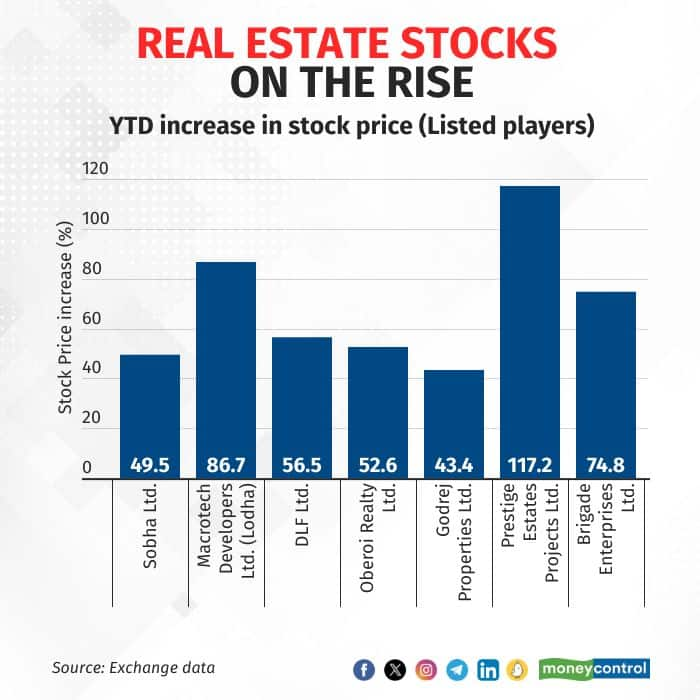 .
.
Sector recovery
Real-estate sales boomed between 2004 and 2008, which resulted in players buying excessive land. But for a decade starting 2010, sales were slow, unsold inventory was high, construction was getting delayed and projects were being stalled. Factors such as GST and demonetisation also weighed down on spending among consumers.
This, according to Niket Shah, fund manager, Motilal Oswal Asset Management, changed with the pandemic, when people started to realise the need for buying property. This was either to address their need for larger spaces with dedicated working rooms or high net worth individuals (HNIs)and non-resident Indians (NRIs) seeking to safeguard their investments amidst global macroeconomic uncertainties.
“In that time, a lot of people who were sitting on the fences bought real estate. The inventory, which used to be very high, went down to below 15 months (for at least the Mumbai market). Luxury inventory is closer to a year or slightly below a year now,” Shah explains.
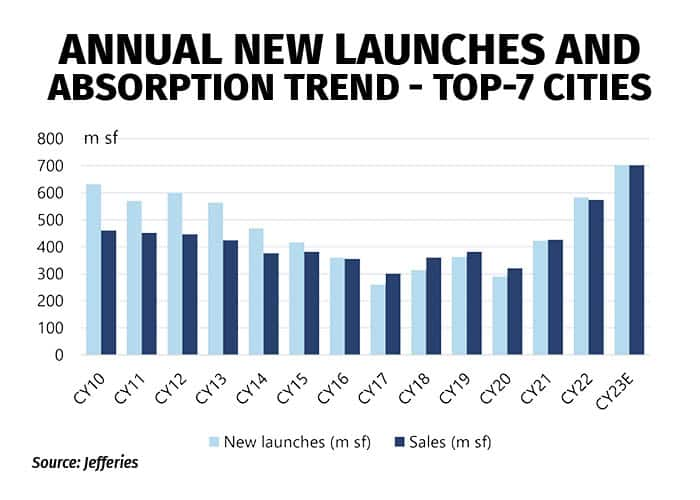
According to the December 2023 Motilal Oswal report, with inventory for listed companies below 10 months, launches are expected to double in the second half of FY2024 to 60 million square feet. In value terms, launches are expected to grow to Rs 82,000 crore from Rs 26,000 crore during the same period.
Also read: 5 reasons why Mumbai's real estate market is glittering this festive season
Push for marquee projects
November 2023 has already seen a significant push for marquee project launches by listed companies, noted foreign broking firm Jefferies.
Oberoi marked its Thane entry with the launch of its ~Rs 2000 crore (Phase-1) Kolshet project. Lodha expanded to Bengaluru by launching the Rs 1,200-crore Mirabelle Manyata project. Prestige has also launched its large 10 msf Hyderabad 'Prestige City' Township. DLF's Rs 5,000-crore Arbour-2 project is set to be opened by December 2023 in Gurugram.
With a decrease in inventory, the prices in the segment have also started to see an increase, especially in Mumbai, Delhi, Bengaluru, and Hyderabad. This increase in price, Shah says, gives further confidence to investors who were earlier on the fringes.
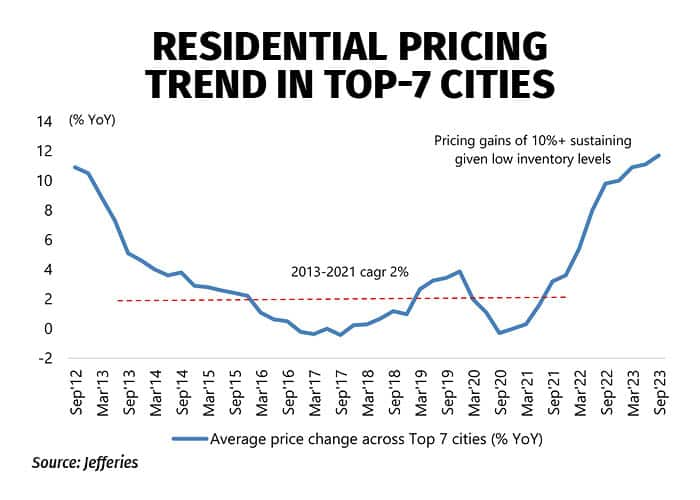
Widening gap
Axis Mutual Fund’s Shreyash Devalkar says that the real-estate segment was expected to grow after a decade of prices being down. But as the segment recovered, the luxury segment started seeing faster growth, which is not surprising due to a widening rich versus poor gap in the market, he said.
“After every crisis, you will see divergence in big economies. Inflation hurts the poor more than anyone else. That is a K-shaped recovery. In India, the upper part of K, which is a bigger chunk, is seeing faster recovery. After any crisis, as the gap widens, more beneficiaries emerge, and the cycle starts,” he explains.
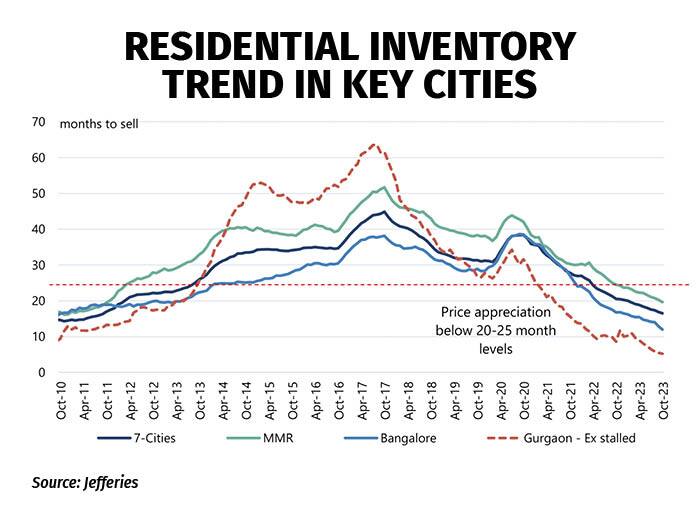
An extra push that boosted the luxury segment were the new provisions on capital gains. The government, during Budget 2023, capped the deduction from capital gains on residential property investment, at Rs 10 crore.
Up until now, there is no such limit, and high net worth individuals often use this route to reduce tax liability. With the new provision set to be enforced from April 2024, many HNIs wanted to buy luxury real estate before the deadline.
According to Shah, there might be a slight moderation in the segment, once the provision is in place, which means prices could also taper off, but long-term structural drivers are still strong. The luxury segment is poised to grow around 30 percent, primarily because that segment of customers is either benefited by stronger equity market flows, capital gains, ESOPS, etc.
All these, however, doesn’t mean that the non-luxury segment is not doing well. If it is not doing as well, it is due to the rise in interest rates and its impact on EMI-dependent consumers looking for affordable housing options. Jefferies expects property prices to rise 10 percent year on year (~25-30 percent higher in three years).
“If you adjust for inflation, prices are still much lower than what they were in the previous cycle. Once interest rate cuts start, the affordable segment will also see a renewed uptick,” said Shah.
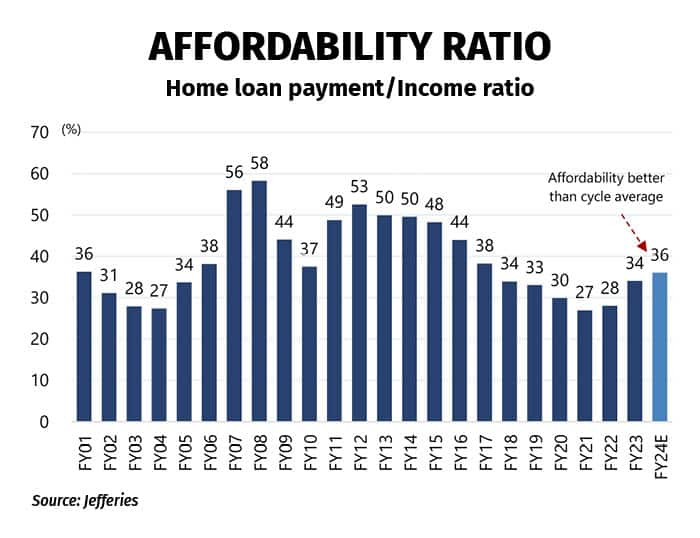
Trend to continue but what about valuations?
The realty index is up close to 90 percent since the March 2023 bottom, following strong sales and RBI’s rate hike pause. Sector valuations are now significantly above the +1 standard deviation levels and near the 2021 peak multiples, reducing rerating headroom, according to Jefferies.
This means any uptick in debt levels or slowing pre-sales can make investors cautious. The net debt of the top eight listed developers reduced from Rs 40,500 crore in FY20 to over Rs 23,000 crore in FY23.
That said, Jefferies believes relative valuations are still attractive for Godrej Properties and Sunteck, making them the brokerage house’s preferred picks. Domestic broking firm Motilal Oswal Financial Services also picked the same two stocks from the real estate pack after BJP won the assembly elections in three states on December 3.
Disclaimer: The views and investment tips expressed by investment experts on Moneycontrol.com are their own and not those of the website or its management. Moneycontrol.com advises users to check with certified experts before taking any investment decisions.
Discover the latest Business News, Sensex, and Nifty updates. Obtain Personal Finance insights, tax queries, and expert opinions on Moneycontrol or download the Moneycontrol App to stay updated!
Find the best of Al News in one place, specially curated for you every weekend.
Stay on top of the latest tech trends and biggest startup news.